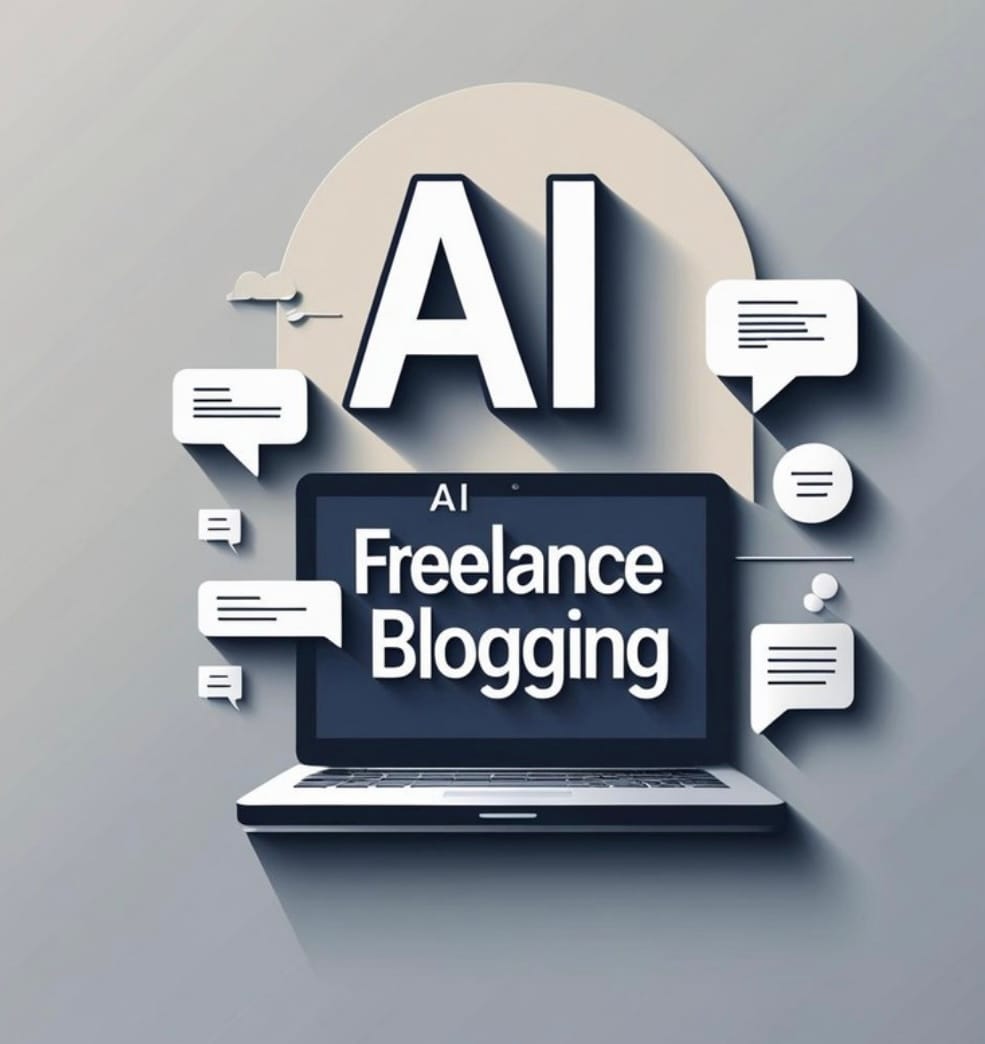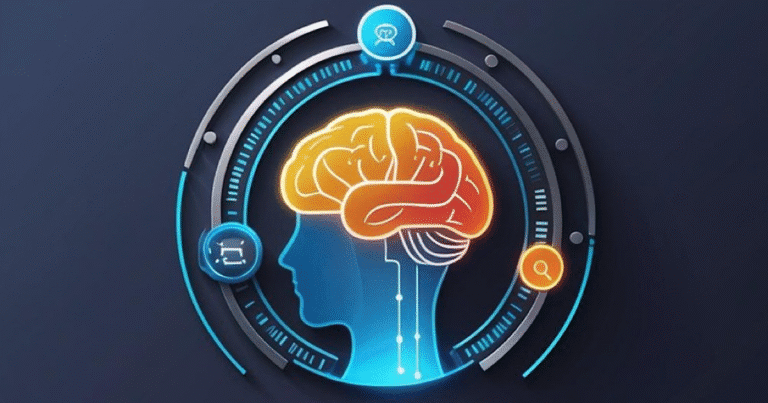Exciting AI Freelance Blogging in 2025: Future & Ethics Uncovered
Introduction
Can a machine take over your blog—and should it?
That’s the question echoing across coffee shops, coworking spaces, and content creator chats in 2025. We’re living in the golden age of artificial intelligence, where tools like ChatGPT, Jasper, and KoalaWriter are no longer futuristic novelties—they’re part of daily life. Writers, bloggers, and freelancers everywhere are turning to AI to boost creativity, speed up workflows, and even make passive income.
But this rise of machine-assisted content creation hasn’t come without controversy. Some fear AI will kill creativity. Others worry about legal gray areas, Google penalties, or the ethics of publishing something written—at least in part—by a bot.
This post dives deep into the new world of AI Freelance Blogging, where opportunity meets uncertainty. We’ll unpack the hype, the risks, and the practical realities of using AI in your blogging journey. Whether you’re a curious beginner or a seasoned writer looking to evolve, you’re in the right place.
Let’s explore what happens when humans and machines write the future—together.
What Is AI Freelance Blogging?
Defining AI + Freelance Blogging in 2025
In the simplest terms, AI freelance blogging is the fusion of two fast-growing worlds: artificial intelligence and independent online writing. It’s about using smart tools—like ChatGPT, Jasper, and KoalaWriter—to create blog content faster, smarter, and more effectively, whether for personal projects or paying clients.
Let’s break it down.
Imagine you’re a freelance writer juggling multiple deadlines. One client wants a 1,500-word SEO blog on sustainable living. Another needs an engaging product review for a tech gadget. With AI in your toolbox, you can quickly generate outlines, research content, or even draft intros and conclusions in seconds. You’re not replacing yourself—you’re upgrading your process.
In 2025, AI tools don’t just spit out robotic content. They suggest headlines, optimize for search engines, adjust tone, and even follow style guides. They can rewrite a clunky paragraph into something that sings. And for freelancers, this means more output, better quality, and more room to focus on what matters—storytelling, strategy, and client relationships.
Here are a few ways freelancers use AI in their workflow:
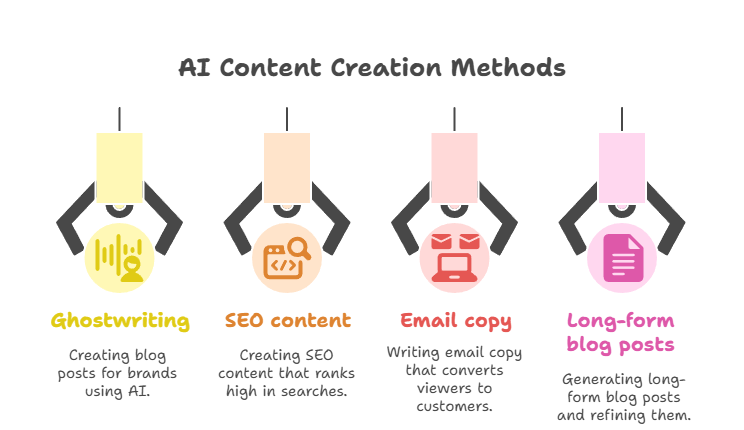
At its best, AI freelance blogging is a collaboration between human skill and machine speed. It’s not about cutting corners. It’s about keeping up, leveling up, and working smarter in an era where content demands are growing faster than ever.
Can I Do Freelancing With AI?
How AI Empowers Freelancers
The short answer? Yes—you absolutely can. And many already are.
Freelancing with AI isn’t about cutting corners; it’s about cutting time. Imagine having a virtual writing assistant by your side 24/7—ready to brainstorm blog titles, draft social captions, summarize research, or polish your grammar with a few prompts. That’s what today’s AI tools offer: speed, support, and a major edge in a competitive freelancing world.
Whether you’re a content creator on Fiverr, a ghostwriter on Upwork, or a niche blogger building your brand, AI can dramatically streamline your workflow. No more spending hours outlining a post or researching the same topic over and over. With tools like ChatGPT and Jasper, you can go from idea to first draft in minutes.
Real-world use cases include:
- Client blogging gigs where AI helps generate outlines, hooks, and drafts.
- Social media content creation, using AI to write engaging captions and hashtags.
- SEO-focused writing, where you feed the AI your keywords and get structured content to refine.
- Niche site blogging, where AI assists in bulk-producing posts, which you then humanize and optimize for rankings.
One rising trend is freelancers offering “AI-enhanced writing services.” This means faster turnaround, better scalability, and competitive pricing—which clients love.
Of course, the key is not to rely blindly on the AI. It’s a tool, not a substitute for your voice, experience, and emotional connection with readers. The best freelancers use AI to handle the heavy lifting, then step in to shape the final message with nuance and soul.
| Task | Traditional Workflow | AI-Enhanced Workflow |
| Blog Outlines | Manual brainstorm | Instant structure with AI prompts |
| First Draft Writing | 3–5 hours | 30–60 minutes with AI assistance |
| SEO Optimization | Keyword research + plugins | Built-in AI suggestions |
| Editing & Proofreading | Manual or Grammarly | AI style + tone enhancement tools |
| Idea Generation | Industry trend research | Real-time AI brainstorming |
Is It Okay to Use AI for Blogging?
Ethics, Transparency, and Smart Use
This is the million-dollar question for every modern writer: Is using AI in blogging honest—or just a shortcut?
The truth lies in how you use it.
AI should never be your autopilot. It’s your co-pilot—an assistant that helps you think faster, write smoothly, and organize better. But just like a plane still needs a pilot, AI-written blogs still need you: your judgment, your creativity, your humanity.
Let’s talk about ethics. Transparency is key. If you’re writing for clients or publishing reviews, it’s wise to disclose when AI has helped shape the content. Not only is it honest—it builds trust. Many top bloggers now openly state that they use AI for research or outlining, but personally refine the final piece. That’s ethical and professional.
What matters most is the value you bring. Does the post solve a reader’s problem? Is it thoughtful, clear, and engaging? That’s what counts.
You also have to put in the work. AI may give you a decent draft, but without your edits, it’ll likely lack emotional depth, cultural nuance, or that spark of originality readers crave. AI gives you the bones—but your voice is the flesh, the skin, the soul.
So yes, it’s okay to use AI for blogging—as long as you use it responsibly and intentionally.

Are AI Blogs Legal?
What the Law Says About AI Content
Let’s clear up the confusion: yes, AI blogs are legal—but there are a few important rules you need to understand if you want to stay out of trouble.
First up: copyright. The law is still catching up with AI, but here’s the gist—most countries don’t recognize AI-generated content as something that can be copyrighted unless there’s a clear, significant human contribution. That means if you publish a blog post written entirely by AI, and someone copies it, you might not be able to claim ownership or sue for infringement. To be safe, always add your input—edit, expand, rephrase, and make it your own. That way, your content becomes eligible for copyright protection.
Now, let’s talk about the FTC (Federal Trade Commission). If you’re monetizing your blog with affiliate links, sponsored posts, or paid promotions, you’re required to disclose any material connection. This applies whether the content was written by you or with AI help. Transparency matters. Adding a simple note like “This post was assisted by AI and edited by a human” can help you stay compliant and build trust.
Different platforms also have their own rules:
- Medium has a mixed stance and may flag or restrict AI-heavy content.
- LinkedIn allows AI-assisted posts, but prefers authentic engagement.
- WordPress is more open, letting creators decide how to use AI responsibly.
The bottom line? AI blogging is legal, but how it matters. Always stay informed, stay transparent, and use AI as a tool—not a loophole.
| Legal Area | Guideline |
| Copyright | Add human input to claim ownership of AI-assisted content |
| FTC Disclosures | Disclose sponsored content and AI involvement if relevant |
| Platform Policies | Check platform-specific rules (e.g., Medium may restrict pure AI blogs) |
| Content Authenticity | Use AI ethically and enhance it with your voice and knowledge |
Can You Make Money With AI Blogs?
Realistic Monetization Paths
The idea of making money with AI blogs isn’t just a fantasy—it’s already happening for many savvy creators. But like any business, success depends on strategy, effort, and a little bit of patience.
One of the most popular ways to earn is through affiliate marketing. Imagine creating a niche blog about eco-friendly products. AI tools can help you churn out informative reviews, buying guides, and how-tos at a faster pace. With smart SEO strategies—targeting long-tail keywords and optimizing your content—you attract visitors who are ready to buy. When they click your affiliate links and make purchases, you earn commissions.
Beyond affiliate sites, ad revenue remains a steady income stream. More content means more page views, which can translate into higher earnings from Google AdSense or other ad networks. AI lets you publish consistently, giving your site the volume it needs to grow.
Freelance gigs are another avenue. Clients are increasingly asking for AI-enhanced writing that delivers fast turnaround and polished drafts. Whether you’re ghostwriting blogs, crafting email sequences, or creating landing page copy, AI tools make you more productive—and more profitable.
Take Sarah, a stay-at-home mom who wanted to start a side hustle. Using ChatGPT, she began producing two well-researched blog posts a week for her wellness niche. After six months, her affiliate income crossed $700 monthly. She credits AI for helping her keep up with content demand without burning out.
While AI can speed up writing, SEO strategies haven’t changed much. Focus on:
- Keyword research and natural placement
- Creating valuable, original content
- Building backlinks and engaging readers
Success with AI blogs is a marathon, not a sprint. With the right approach, AI tools become your powerful partner in building sustainable income.
Can Google Detect AI Blogs?
Understanding Detection and Ranking
Many writers wonder if Google can spot an AI-generated blog and what that means for their rankings. The answer is nuanced: Google has the technology to detect patterns that might suggest AI involvement, but detection alone isn’t a penalty.
Google’s main focus is on E-E-A-T—Experience, Expertise, Authoritativeness, and Trustworthiness—and delivering helpful, original content to users. Whether a post is AI-assisted or human-written doesn’t matter as much as whether it genuinely helps the reader and meets quality standards.
So, how can you make sure your AI-assisted blog passes any AI detection filters and ranks well?
- Edit thoroughly: AI drafts often need human refinement to improve flow, clarity, and accuracy. Make sure your final content sounds natural and reflects your unique voice.
- Add originality: Personal stories, expert insights, and real examples make your content stand out and add depth beyond what AI can generate.
- Structure well: Use clear headings, bullet points, and optimized metadata to help Google understand and rank your content effectively.
When these practices are followed, AI blogs can perform just as well—or even better—than fully human-written posts. Many top bloggers use AI as a starting point, then polish their content carefully to meet Google’s high standards.
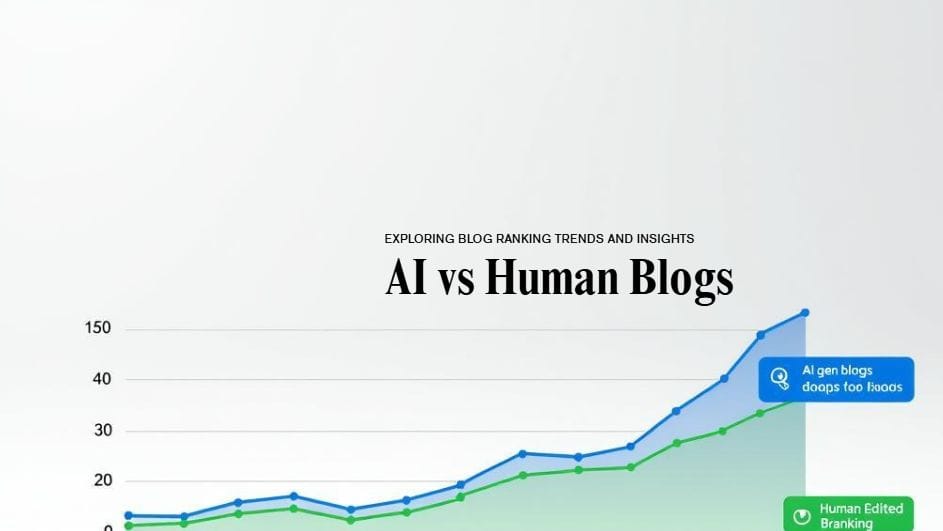
Is Blogging Dead in 2025?
Evolution, Not Extinction
With TikTok dances going viral in seconds and YouTube shorts grabbing eyeballs by the millions, many are quick to declare: Is blogging dead? The short answer is no, but it has definitely transformed.
In today’s fast-paced digital world, platforms like TikTok, Substack newsletters, Threads, and YouTube offer bite-sized, highly visual content that satisfies short attention spans. Users scroll, swipe, and engage with these formats more than ever before. However, this doesn’t mean blogging is obsolete. Instead, blogging has evolved.
Blogs remain essential for deep-dive content that social media simply can’t match. They provide a space for in-depth storytelling, comprehensive tutorials, and detailed product reviews. Most importantly, blogs play a critical role in SEO. Search engines still love well-structured, keyword-rich blog posts that answer questions thoroughly. This means blogs are the backbone for building long-term organic traffic and trust.
Brands and creators are adapting by integrating blogs with other formats. For example, a viral TikTok video might link back to a detailed blog post for those hungry for more information. Newsletters like Substack are blending email and blogging to create intimate, trusted communication.
So, blogging isn’t dead—it’s alive and evolving, thriving alongside new platforms. It’s no longer just about writing; it’s about creating a multichannel content ecosystem that meets audiences wherever they are.
Will ChatGPT Replace Blogs?
Why Human Context Still Wins
It’s tempting to wonder if ChatGPT and other AI tools will replace blogging entirely. After all, they can generate paragraphs in seconds—but the truth is more complex.
ChatGPT doesn’t possess opinion, nuance, or emotion—the very elements that make blogs relatable and engaging. It can mimic tone and style, but it can’t live your experiences or connect with readers on a human level. That personal touch—the stories, the insights, the passion—that’s what keeps readers coming back.
Instead of replacing blogs, ChatGPT works best as a complementary tool. Think of it as your brainstorming partner, a first-draft assistant, or a digital editor. It handles the repetitive tasks, freeing you to focus on creativity, analysis, and storytelling.
Looking ahead, the future of content lies in AI-assisted journalism—where humans and machines collaborate to produce smarter, faster, and more thoughtful writing. Robotic blogs without human input may lose relevance, but blogs with human context enhanced by AI will thrive.
In short, ChatGPT won’t replace blogs—it will help bloggers become even better.
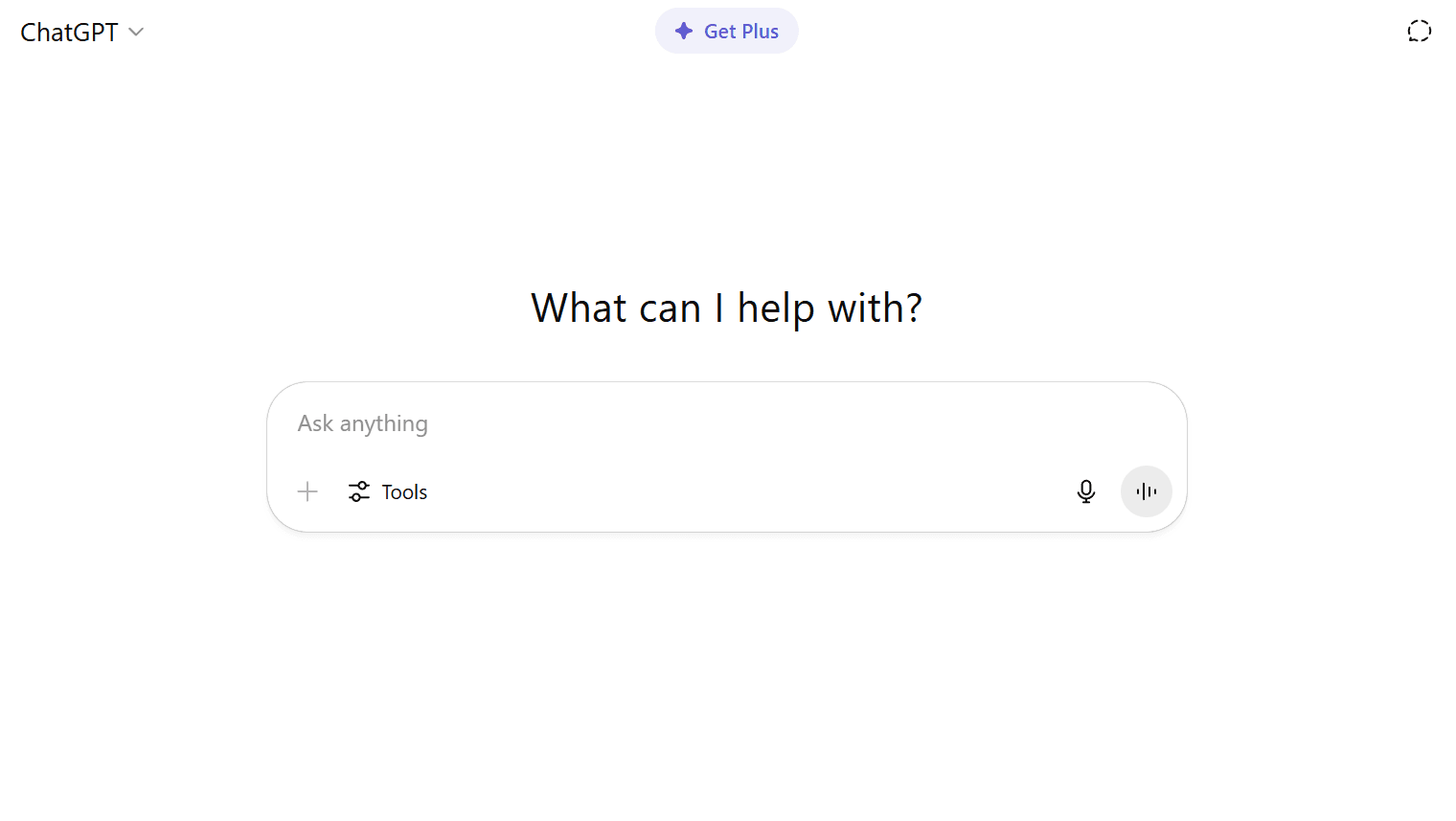
Do AI Blogs Hurt SEO?
When AI Helps (and When It Hurts)
AI blogs don’t inherently hurt SEO—but how you use AI can make all the difference.
The biggest risk? Over-automation. If you churn out AI-generated content without adding value, depth, or originality, search engines may see it as “thin” or spammy. Google’s algorithms are designed to reward content that genuinely helps users—not just fills pages with keywords or generic information.
On the flip side, AI can be a powerful ally in SEO when used wisely. The best approach is a hybrid model: start with an AI-generated draft to save time, then apply your expertise to polish the writing. Add personal insights, up-to-date data, and storytelling to enrich the content. This blend ensures your posts are both fast to produce and packed with real value.
Remember, Google prioritizes user experience. So avoid keyword stuffing and robotic tone. Focus instead on creating engaging, well-structured, and authoritative content that addresses your audience’s needs.
In short, AI blogs help SEO when they’re thoughtfully crafted—and hurt SEO when they’re lazy shortcuts.
Will Google Close Blogger?
Speculation vs Reality
There’s been a lot of buzz and worry about whether Google will shut down Blogger, especially as its popularity has declined over the years. While it’s true that fewer people use Blogger compared to modern platforms, as of 2025, it remains active and functional.
Google’s recent focus on AI and newer content tools doesn’t automatically signal the end for Blogger. Instead, Google seems to be prioritizing innovation across its ecosystem without completely abandoning older platforms. Blogger still serves millions who want a simple, free way to publish content without technical hassles.
For those looking for alternatives, platforms like WordPress, Ghost, Medium, and Substack offer more advanced features, customization, and community-building options. These platforms are rapidly growing in popularity among bloggers, freelancers, and creators.
So, while Blogger might not be the shiny new star, it’s far from dead. Its future depends on Google’s strategic priorities—but for now, bloggers have plenty of options to keep their content thriving.
What Is Replacing Blogging?
Microcontent, Video, and Email Revival
Blogging isn’t disappearing—it’s evolving alongside exciting new formats that capture today’s fast-moving attention spans. The rise of newsletters, podcasts, and short-form videos has created fresh opportunities for creators to connect with audiences in more personal and dynamic ways.
Newsletters, especially on platforms like Substack, offer a direct line to loyal readers who want curated, thoughtful content delivered straight to their inbox. Podcasts bring stories and ideas to life through voice, creating deep engagement without the need to read. Meanwhile, short-form videos on TikTok, Instagram Reels, and YouTube Shorts grab attention in seconds with visual storytelling.
Despite this shift, SEO still thrives through written content. Search engines rely heavily on well-crafted blogs to understand and rank topics. What’s changing is where and how audiences consume content. Successful creators diversify their footprint—mixing blogs with newsletters, videos, and podcasts to reach people across multiple channels.
Here’s a quick look at the pros and cons of each:
| Format | Pros | Cons |
| Blog | Great for SEO, depth, and evergreen | Requires time, skill, and effort |
| Newsletter | Builds a loyal audience, direct reach | It can be hard to grow a subscriber base |
| TikTok | Viral potential, high engagement | Short lifespan, less depth |
| Podcast | Personal connection, multitasking-friendly | Production-intensive |
In short, blogging is part of a broader ecosystem. To thrive in 2025 and beyond, creators must embrace multiple formats, each serving unique purposes and audiences.
Can ChatGPT Edit My Blog Post?
AI as an Editing Assistant
Absolutely—ChatGPT can be a powerful ally in editing your blog posts. It excels at polishing grammar, adjusting tone, rephrasing awkward sentences, and even helping you sprinkle in relevant keywords naturally. Think of it as a smart writing partner who can help make your drafts clearer and more engaging.
Many writers combine ChatGPT with dedicated tools like Grammarly for a double layer of editing. While ChatGPT can offer creative rewrites and style tweaks, Grammarly specializes in catching grammar slips, punctuation errors, and clarity improvements. Together, they form a dynamic duo for refining your content.
That said, human oversight remains essential. AI can sometimes misinterpret context, suggest awkward phrasing, or overlook nuanced facts. You’re still the final judge—checking accuracy, maintaining your unique voice, and ensuring the post truly reflects your message.
In short, ChatGPT is a helpful editing assistant, not a fully autonomous editor. Use it to save time and improve quality—but never skip the human touch.
Frequently Asked Questions
Can you legally freelance with AI-written content?
Answer: Yes, you can legally freelance using AI-written content, provided you respect copyright laws and add significant human input. It’s also important to disclose AI involvement when required, especially in sponsored or client work. Creating original, valuable content remains key to staying compliant and professional.
Will AI blogging be sustainable for income in 2025?
Answer: Absolutely. Many bloggers are successfully generating income by combining AI efficiency with expert human insight. Niche blogs, affiliate marketing, and SEO-focused strategies that use AI to speed up research and drafting can create sustainable, scalable revenue streams for freelancers and content creators.
Will Google ban or penalize AI-generated blogs?
Answer: Google does not directly ban AI-generated content. Their focus is on the quality and helpfulness of content rather than how it was created. AI blogs that are well-edited, original, and provide real value to readers will not be penalized. The key is ensuring the content meets Google’s E-E-A-T standards and is free from spammy or thin content.
Conclusion
AI Freelance Blogging is a powerful opportunity reshaping how writers create and earn online. While it offers incredible speed and productivity, it also brings important questions about ethics, originality, and quality. The key is to use AI wisely—as a tool to augment your skills, not replace your unique voice.
Experimenting with AI can unlock new creative possibilities, but always remember to stay true to your vision and values. Your authentic perspective is what truly connects with readers.
Thinking of launching your AI-powered blog? Start smart, stay ethical, and blend AI with authenticity to build content that stands out and stands the test of time.
MORE AI GUIDE: Ultimate Guide: What Is Passive Income? 21 Smart Ways to Earn in 2025
